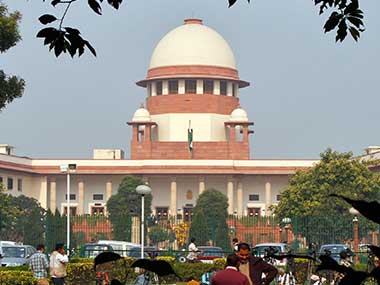New Delhi: In the age of digitisation and increasing reliance on computerised records in judicial proceedings, the Supreme Court has held that the requirement of a certificate to make an electronic evidence admissible is not mandatory “wherever interest of justice so justifies”. The top court’s clarification on Section 65B of the Indian Evidence Act, which deals with admissibility of electronic evidence in court proceedings, will have an impact on criminal trials, where an increasing number of call details records, CCTV footage, mobile video recordings and CDs are being relied upon. Interpreting Section 65B(4) of the Evidence Act, a bench of Justices AK Goel and UU Lalit said the provision should be applied only when such electronic evidence is presented by a person who is in a position to produce such certificate. Section 65(B) of Indian Evidence Act says that electronic records needs to be certified by a person occupying a responsible official position for being admissible as evidence in any court proceedings. [caption id=“attachment_4334995” align=“alignleft” width=“380”]  File image of Supreme Court. Reuters[/caption] The top court, while examining the issue of video recording of crime scene in the country, dealt with the question if electronic evidence can be admissible for reliance in judicial proceedings. It said that if a person is not in a position to produce such certificate the provision of 65B should not be applied. “If this is not so permitted, it will be denial of justice to the person who is in possession of authentic evidence/witness….Thus, requirement of certificate under Section 65B(4) is not always mandatory,” the bench said. The top court considered the views of four senior advocates Arun Mohan, Jayant Bhushan, Yashank Adhyaru and Meenakshi Arora, who were appointed as amicus curiae to assist in interpreting the provision of 65B, to enable admissibility of electronic records. “Accordingly, we clarify the legal position on the subject on the admissibility of the electronic evidence, especially by a party who is not in possession of device from which the document is produced. Such party cannot be required to produce certificate under Section 65B(4) of the Evidence Act,” the bench said. The top court said that the applicability of requirement of certificate being procedural “can be relaxed by court wherever interest of justice so justifies”. During the marathon hearing, which continued for several days, the apex court also referred to two English Laws– Civil Evidence Act, 1968 and Police and Criminal Evidence Act, 1984 – which dealt with the admissibility of electronic evidence but have now been repealed in the United Kingdom. Senior counsels argued that at present under the existing provision, if a statement was given in the form electronic evidence, a certificate was required from a person occupying a responsible position in relation to operation of the relevant device or the management of relevant activities. It was contended that if the electronic evidence was relevant and produced by a person who was not in custody of the device from which the electronic document was generated, requirement of such certificate could not be made mandatory. Senior advocate Jayant Bhushan said that section 65B of the Evidence Act was a “procedural provision” intended to “supplement the law” by declaring that any information in an electronic record, “is admissible in any proceedings without further proof of the original”. The bench had queried the senior lawyers, whether a person who wants to take a recourse of alibi in a criminal trial with the help of boarding pass of a flight, where there was no signature and was just a printout from a computer, can that document be not relied by the court for want of such certificate. Similarly, the court gave another illustration and said suppose a person relies on a computer-generated receipt or a bill of a departmental store, which is given now a days at every small or big such shops, can the court say first go and get the certificate. “These are the questions, which we need to deliberate,” the bench said, and added that courts cannot afford to deny acceptance of such documents for want of certificate under section 65B. Bhushan said that the evidence should be accepted by the court and later sent for verification to technical labs to see if it was tampered or not. The bench said that section 65 B of Evidence Act is a procedural provision and if the electronic evidence is “authentic and relevant” the same can certainly be admitted, subject to the satisfaction of the court and it may depend on situation such as “whether the person producing such evidence is in a position to furnish certificate under Section 65B(4)”.
The Supreme Court has held that the requirement of a certificate to make an electronic evidence admissible is not mandatory “wherever interest of justice so justifies”.
Advertisement
End of Article


)

)
)
)
)
)
)
)
)



